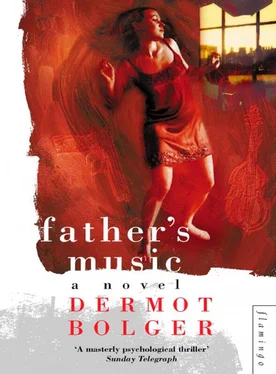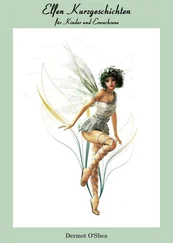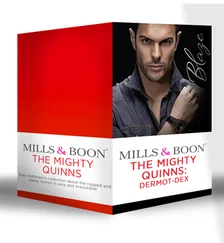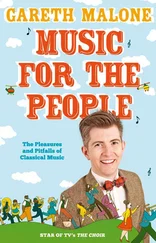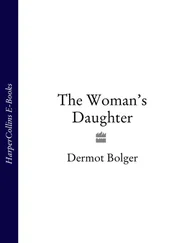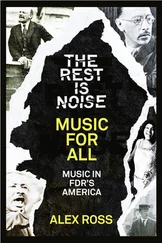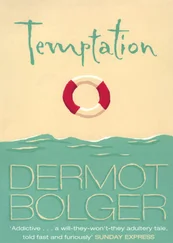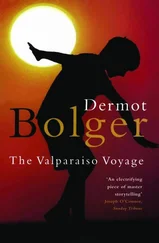But if I reserved one life for Sundays, it was on Saturdays that I really had my fun back then, with Roxy and Honor. We toured the clubs, trying to stay together as the E took hold and we threw ourselves into the joyous wave of bodies skewed about in the strobe lights and found each other again when we were washed out the other side. Sometimes there were vans that sped for hours along motorways, crammed full of underdressed girls and lank youths with dandruff and socks that could walk home by themselves.
We always had to stop to allow someone to get sick and stood about, arguing with the spaced out driver who swore blind that he wasn’t lost. When we finally arrived, the raves were never as good as the expectations built up on those journeys. We would find ourselves in a field at dawn with damp grass and sheep shite trampled underfoot. There was a manic blankness in people’s eyes as they danced like their movements were a nervous twitch they couldn’t shake off. Even when their eyes closed as if asleep, their legs wouldn’t stop moving. Music pulsed inside them like an orgasm they couldn’t be released from, the pleasure of which paled and pained but continued on. Finally, when legs shuffled to a halt by themselves, a thirst remained like a purgatory which no Christ in no desert ever endured. By the time the local police arrived, the vans that had brought us there were gone. I hated the journeys where they herded us back to London and I’d finally unlock my flat door, too tired to open a window and release the odour of trapped heat and sour milk.
Those burnt out evenings were to be avoided. That was why Roxy and Honor and I fell out from those dance clubs most Saturday nights before the temptations of vague location maps and offers of lifts were passed around. Sometimes, giggling and swaying about the after-hours streets, we would stumble across a gig in some fire-trap basement club. If the band were inexcusably chronic we’d push our way up to the stage, dancing and screaming our adoration at the acne-scarred singer, puffing him up to more ludicrous posing. We’d cluster at his feet, shouting between songs that we would wait outside for him to take all three of us in the one bed later that night. Rather than fight among ourselves we had decided to share his body.
If the bouncers hadn’t already cottoned on to us, we’d point towards the exit and blow kisses at him, before staggering out to laugh and fall against the shop windows, imagining him rushing to finish the gig. We’d play our favourite game of trying to out-stare the mannequins, shrieking over which shop dummy had winked back first. Then we’d order kebabs in some dingy restaurant, taking turns to trip down to the ladies and put our mouths under the tap. We’d sit, trying to cajole a smile from the sullen waitresses. I was happy there, loved by my friends and loving them back. Nothing could ever come between us. My life in Harrow had vanished and my future would have to wait because the present seemed so immaculate.
But eventually, when chairs were being piled onto the formica tables, we were forced on to the streets again. It would be nearly dawn and we’d stumble into Tower Records where serious night owls with horn-rimmed glasses scoured through the back catalogues of Gerry’s Left Testicle or other punk bands from Papua New Guinea. We never lasted long there before we were thrown out. But sometimes, as the first ache of sobriety turned my stomach sour, I’d find myself flicking through the Irish section. The foreign names were unpronounceable, crammed with Os and Macs and crooked accents. I’d stare at the high cheekbones and bony elongated fingers of old pipers on sepia covers. There was even a tiny section reserved for sean-nós singing: a solitary, indecipherable wailing without any musical backing at all.
My mother once told me that my father, Frank Sweeney, sang as well as played the fiddle. He had reined in his wanderlust long enough to witness my birth before deserting us to return to Ireland. That was all I knew. I rarely thought about him or cared if he might still be alive. But sometimes during those raids on Tower Records I was glad that Roxy and Honor were goading a nerd as I searched in vain for what my mother once told me was his favourite tune, Last Night’s Joy . I’d take the earphones from a listening post and select a disc at random. A grainy dawn would have broken with traffic easing off, leaving only black taxis speeding to catch the lights. I’d close my eyes, listening to the ebb of that impenetrable music and think of my mother dying in Northwick Park Hospital a year before. I didn’t know what those tunes meant, each one sounding the same, only faster. Even their names gave no clue: The Frost is All Over, Jenny Picking Cockles, The Pigeon on the Gate .
They should have conjured up images of hillsides of barley shaken by the wind, or hares bounding through the winter dark as boots crunched ice on potholes along a lane. Instead I saw my mother’s face on a hospital pillow and thought of how I had never heard her listen to that music which, Grandad told me, my father had played in the back bedroom. My father’s music and my mother’s pain. Their daughter’s futile regrets after the bird had flown. The music gave way to white static and suddenly it was Bessie Smith I wanted to hear, her pain resonating in the heavy pausing as she sang, Sometimes I feel like a motherless child .
I should be over her death by now, but too much guilt seemed involved to properly mourn her. I’d listen to the clamour as another reel began, knowing that two hysterical girls were about to grab the headphones and shriek with laughter at what was playing. ‘Now that’s what I call jungle music,’ Honor would mock in her London accent laced with a Jamaican twang. What could I do, except pretend to share their mirth as the guard threw us out and we walked the streets until a taxi was found?
That was how, at six o’clock most Sunday mornings, I’d lean against my bedsit door, knowing the same memories were waiting to entrap me. I would be dejected and hungover, filled with regret for the passing of something I’d never properly known. I’d shut my eyes and see the swings in Cunningham Park in Harrow at dawn that previous August. For once the bowling greens had been without their flock of white-clad pensioners, but a group of teenagers still huddled around a ghetto-blaster, like zombies in a bad B-movie, as I had passed.
I hadn’t even found somewhere private to say goodbye to my mother back then. But there had been no special places for the pair of us, no woodlands where mother and daughter had run through a riot of spring flowers or avenues of autumnal leaves. I hadn’t even the memory of sharing a garden bench with her some summer night when she might have put names on to the scattered map of the stars. Maybe I had blocked such memories out that morning, because her death left a numb sensation. But, throughout her cremation, all I had kept remembering was a swing creaking in Cunningham Park, and my eight year old voice afraid to repeat the questions about whether I’d once had a daddy and where he might be. I could recall pain lining her face as, distractedly, she pushed me higher into the air than it felt safe to go, and the sense of being punished for saying something wrong.
Those swings were broken last August when I had knelt to scatter her ashes on the grass. She had always liked that view sweeping up to the public school on the hill. There was heavy rain forecast. I remember wondering if the teenagers had sat there all night. They finally lifted their heads indifferently to watch me open the urn. What did I expect to happen? That her ashes might dissolve with the dew or there would be a sign she was finally at peace? I felt foolish kneeling there. I rose and looked down. I had no God to pray to and I knew she couldn’t really hear, but inside my head I spoke, if not to her spirit then to the ache she had left behind.
Читать дальше
